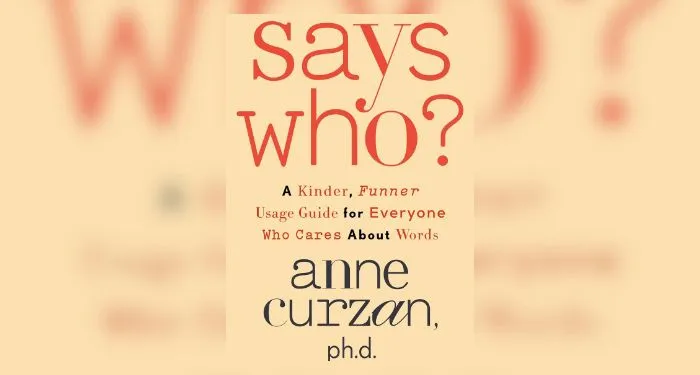
Grammar Nerds, This Book Is for You
Today’s pick might be my favorite nonfiction I’ve read this year. If you’re the kind of person who would have a mug that says, “I’m silently correcting your grammar,” then this one’s for you.

Says Who?: A Kinder, Funner Usage Guide for Everyone Who Cares About Words by Anne Curzan, Ph.D.
I had so much fun reading this book, and I think it is a necessary read for those of us who tend to be grammandos: people who like to correct other people’s grammar and judge them by it. This book has helped me unlearn a lot of things about grammar and punctuation that I had practically embodied as part of my identity. In this book, she encourages us to turn away from the grammando part of ourselves and instead embrace our inner wordie, who is curious about language and fascinated by the ways in which language evolves and changes over time.
One of the things I love about this book is the kindness the author exudes. Her curious tone makes this book so approachable, which is something that books about grammar and punctuation rarely are. So many of us grammandos can be too firm on grammar rules, when in reality, spoken language is different from formal written language, and also, many grammar and punctuation rules fall to pieces depending on the situation.
She digs into things that many people hold to be true, like the idea that “ain’t” isn’t a word and the idea that double-negatives are always incorrect. She writes specifically about the word irregardless, which is an absolutely delicious chapter. Dr. Curzan also talks about how current usage of the word “literally” adopts the definition of “figuratively,” and that’s okay. We know what people mean, even if they say it in a way that would make Strunk and White cry. One of my favorite chapters is on the pronunciation of “ask” as “aks,” and that is something that has had me unpacking some internalized white supremacy for years. I’m amazed at how many of our current grammar and punctuation rules can be traced back to “One guy liked it this particular way and wrote it in a grammar book.”
This is a definite must-read for anyone who cares about words.
Want reading recs in your inbox? Sign up for our Read This Book newsletter!
- How To Pick Which Historical Fiction Book To Read Next
- There’s Never Been a Better Time to Pick Up a Book About Media Literacy
- New Maureen Johnson Mystery, British Serial Killer Procedural, 500+ Page Mysteries & More!
- Black Surrealism, Freedom, Spirituality, and Survival
- Spies Against the Confederacy in This New Historical Fiction
- A Dark, Twisted, Substantially Satisfying Fairytale
- Looking to Get Into Cooking? This Is The Book For You










